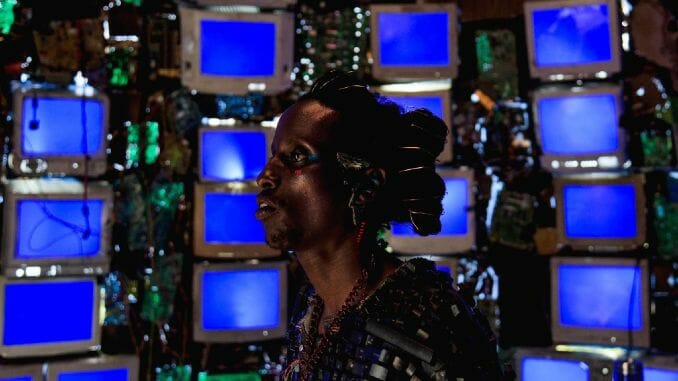Neptune Frost Seeks Liberation through Afrofuturist Anticolonialism

Neptune Frost is a powerful film, clean and digestible while it traffics in metaphors and deploys poetry and philosophy. Directed by Anisia Uzeyman (a Rwandan actress and playwright that also directed photography) and Saul Williams (an American musician and multimedia artist who also wrote the screenplay), Neptune Frost is extensively musical without ever being exhausting. It’s clear in its theses, demanding equity and decency for workers, for citizens of the Global South generally and Rwanda specifically, and for intersex and queer Africans subjected to discrimination and marginalization born from the same colonial traditions that rob nations of their wealth. It’s elegantly shot and engages with traditions of science fiction and anti-colonialist magical realism to frame an alternatingly rough and ornate Afrofuturist aesthetic. Calling Neptune Frost art with a purpose feels like damning it to the pile of things that are “good” because they are “important.” Neptune Frost is valuable because of the creative and organic way it delivers its messages: Questioning colonial legacies and demanding change through a moving, musical script while displaying speculative imagery that requires audiences’ imaginations as well as their eyeballs.
Neptune Frost follows two Rwandans: Matalusa (Bertrand Ninteretse), a worker who sees his brother Tekno killed on the job, and an intersex person who comes to be called Neptune, who avoids being sexually assaulted by the pastor that did their aunt’s funeral service by braining the pastor with a glass bottle. Initially portrayed by Elvis Ngabo, the unnamed Neptune faces ostracization and alienation, as the wary looks they exchange with rural Rwandans signify a lack of trust or safety.
They meet a nun (Cecile Kayiregawa) who knew their mother, then travel by boat from one region of the country to another. After dancing with some kids and being hit by a motorcycle, they experience a transformation—lying on a bed of playing cards, anointed by a mystical-seeming human who heals their injuries and puts them in the dress they’d been concealing in their luggage—and are now played by Cheryl Isheja.
This version of not-yet-Neptune encounters a man (Dorcy Rugamba) who finds them attractive, but narrowly avoids being assaulted once this person grabs at, and is surprised by, their genitals. This sequence and the ensuing escape represent some of the film’s most memorable cinematography, as the character’s own intoxication lends to a trancelike countenance to the framing.
Neptune Frost uses domestic uprisings at universities as its backdrop while an increasingly authoritarian and corrupt central government, referred to as The Authority, represses students and workers. Sleeping under a tree, Matalusa is visited by a pseudo-angel the group later calls “Wheel Man” (Eric 1Key) who presents Matalusa with a prophecy: He’ll meet and fall in love with Neptune, and should hack computer systems as well as systems of oppression. It’s a revolutionary mix of the literal and metaphorical. Matalusa eventually finds a small compound built of discarded electronics, apparently a nexus point for interdimensional travelers like the cyborg Elohel (Rebecca Mucyo) and the sage Memory (Eliane Umuhire), who wears a nest on their shoulder for a scout bird we come to know late in the film as Frost. The group are eventually joined by dissident student-musician Psychology (Trésor Niyongabo), and finally our other original protagonist, now called Neptune.
-

-

-

-

-

-

-

-

-

-

-

-

-

-

-

-

-

-

-

-

-

-

-

-

-

-

-

-

-

-

-

-

-

-

-

-

-

-

-

-








































